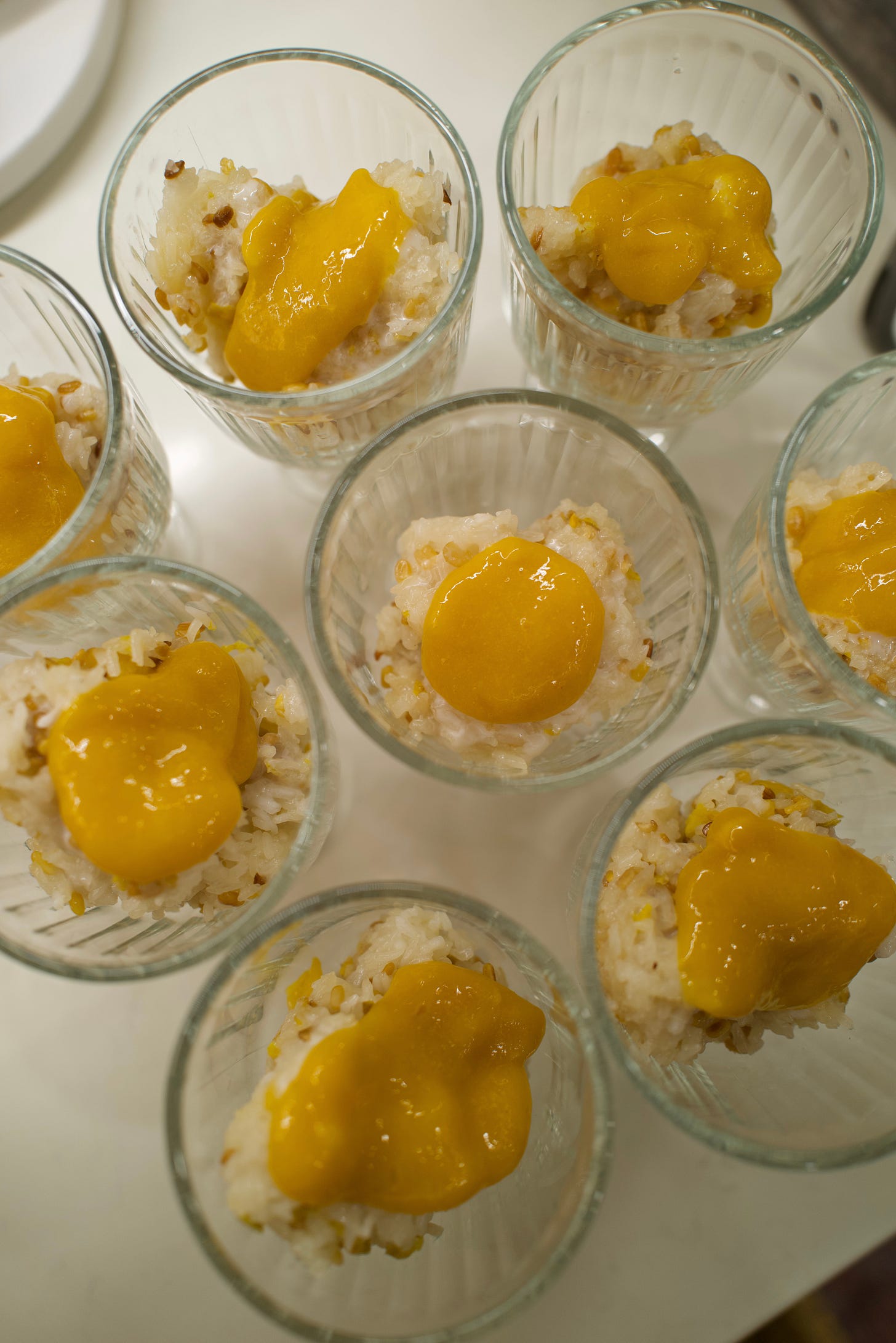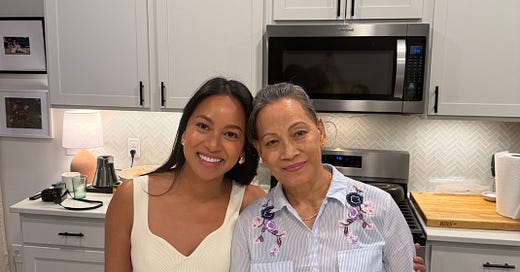... reflecting on my mother's history with cooking and how it saved her life.
Cooking to me is therapeutic. For my mom, cooking during the Khmer Rouge was her safety net.
My relationship with food has always been sacred to me. I find the act of eating to be a very emotional thing and I don’t know if I’m alone in feeling this way. When I’m dining during my solo travels I love taking in the beauty of my meals visually and physically through every bite of my food to taste the culture of where I am. I look around and watch others dine together sharing entrees, laughing, savoring every bite and moment of connection. Have you ever been able to eat while angry? I never have. If I’m the least bit upset, I have a pit in my stomach and I’m incapable of consuming anything, which is why I find eating to be a vulnerable act. Your guard is down and your senses are open to the experience ahead. Hunger itself is a very vulnerable feeling. It can make a person feel weak and it’s a moment where we express a need for something. One that we all experience daily, but not all are fortunate enough to have the resources to fulfill their hunger.
Last week I hosted my parents and brother here at my home in Charleston. We were all hunkered down indoors during Tropical Storm Debby. They arrived one week ago on Sunday and I was actually due to travel to Highlands, North Carolina for a 3-day 2-night work trip. I canceled it Sunday night because of the impending storm. I hate driving in any sort of rain in the south. My brother and his friend drove from Texas for a golfing trip they planned a little over a month prior. It was their first time in Charleston and they drove straight into a storm. I hadn’t seen my brother since January and my parents since April so the fact that I had to cancel my work trip and was given the chance to spend three extra days of quality time with them felt very kismet. My dad and brother renovated my closets and laundry room in my house for some much-needed organization that was consuming me mentally. The renovation of the physical space in my home felt like a refresh for my mental space, too. My mom spent the whole week cooking Khmer food for us as we worked throughout the house. I asked her if we could host a few of my friends on Wednesday night for a Khmer family dinner and she didn’t hesitate to say “Of course!” Aside from her former 35+ years of being a Registered Nurse and a mom to 4 children, cooking was her other full-time job. It was also the first job she ever had that saved her life and the lives of many others during the Khmer Rouge.
Something a lot of people don’t know is that the Khmer Rouge didn’t happen very long ago. It took place in Cambodia between 1975-1979. My parents’ generation is the last to have lived through it. My mom was the oldest of seven children and my dad was the youngest of four. Their siblings and parents all died from starvation or were killed by Khmer Rouge soldiers. My parents were between the ages of 23-27 y.o. during the war. My mom has one surviving sister who immigrated to the U.S. with her. When my friends Kristina, Chelsea, and her husband Mark came over for dinner Wednesday night Mark asked my mom “Have you always cooked?” to which my mom shrugged her shoulders and sighed not really knowing the short answer to his question. There were so many layers to her answer.
When my mom was growing up, my maternal grandmother never let my mom help her in the kitchen. She wanted her to focus on her studies and school and keep her head in the books. But when they would sit down for dinner as a family, my mom would listen to my grandmother tell my grandfather how she cooked everything. “She used a little bit of this with a bit of that and stirred and let it boil and threw in some of this for this flavor.” My mom took note of these conversations every time. While she never had the chance to cook alongside her mom she got to listen in on the love and attention my grandmother poured into every meal she made for her family.
When Pol Pot invaded Cambodia and forced separation between children and their families, the group that my mom was designated to needed a cook to make meals for everyone, including the soldiers guarding them. My mom stepped up as she was the only one who knew how to cook, and her single source of knowledge for cooking simply came from listening to my grandmother. My mom has always been a strong, confident woman, a true matriarch of our family. She always took charge and was a fearless leader, which is very much the eldest daughter in her. Her bravery astounds me. She was taken away from her group four different times to be executed and by the grace of God, she was saved every time. She tells my friends this story in disbelief and still wonders how her life was spared. “I think they needed me as a cook but I also think God was just looking over me and wouldn’t let it be my time.” Whenever someone was taken from the group you never knew if that would be the last time you’d see them.
As the designated cook, my mom would sometimes sneak away with food to feed people in other groups who didn’t get any. Growing up, I used to think my mom always made big portions because she was used to cooking for our family of six, but now I think it’s because her experience with cooking started with making enough to feed a village. It was all she knew. And when we did have excess food she’d always give it to our neighbors. Our neighbors were predominantly white. They never knew how to eat the dishes my mom would bring but she’d graciously deliver them with instructions. This is how she shared our culture with them. She would beam with pride to share a dish that was new to them. This was her way of paying it forward.
Cooking, to me, is a therapeutic hobby. For my mom, cooking during the war was her safety net.
My parents escaped Cambodia in 1979. They walked on foot through the jungle filled with land mines to the border of Thailand where there was a refugee camp. They birthed my oldest brother in 1980 in that refugee camp. When they were brought over to the States in 1981 they were leased an apartment with a dining room table as the only piece of furniture. I think about my parents at the age of 29 y.o. sitting at that dining table with a newborn child, nothing but the clothes on their back, and not knowing how they will feed themselves. They just left their home country for the first time and never knew if or when they would ever return. I feel a pit in my stomach when I think about this image of them sitting across from each other finally feeling safe but all the while uncertain.
It was at this point that my parents satiated a different kind of hunger: hunger for freedom and a better life. They learned English, received their associate degrees, my mom went to Nursing school and my dad became a Mechanical Engineer. Within 9 years of living in the States, they had all four of us Saur children, me being the last.
In elementary school, I used to get picked on for having Khmer food packed in my lunchbox from home. Kids would tease me about the look and smell of it. I’d go home and ask my mom to make me PB&J sandwiches instead so I could fly under the radar and eat my lunch in peace. To this day, my biggest pet peeve is when someone makes a negative comment about the food I’ve chosen to eat. It’s some deep-rooted trauma that goes back to the 2nd grade lunch table. I felt like I was a Cambodian kid at home but tried to be a white kid at school. I kept my Khmer lifestyle hidden from my peers. I felt ashamed and embarrassed by it. There were very few friends I’d have over at my house and they were friends I felt safe to be myself around. My best friend since Kindergarten came over often and loved the Khmer food my mom would make and send her home with. She still craves it to this day! There was also always a slim chance any friend would leave my house without a bag of fruit from my mom.

I think this is why food is so sacred to me and feels like a vulnerable practice. It took me until my late 20s to fall back in love with my culture again and embrace my heritage. Now, I take pride in sharing what makes me different with friends I feel safe around. Friends who open their hearts and minds to learning and connecting with me and my family through our food. It’s Khmer dinners like this that heal old wounds for me. I’ve adopted my love of hosting and cooking from my mom. It’s our love language. It was really special to have the chance to host my friends and family for dinner and to collaborate with my mom on the dishes that were served. It’s like she was the head chef and I the sous chef. Something she unfortunately never had the chance to do with her mother. There is joy and fulfillment to be found in feeding others and my mom has always taught me that even when she didn’t have much to give, she’d give what she could and that was usually food. I hope this story inspires you to cook a meal to deliver to a neighbor, friend, or someone in need, and a reminder to savor all the moments and flavors of life while remaining fully authentically true to yourself.
x, Laura







I’m in Siem Reap now and wanted to come back to this to remember what you shared. Now that I have a better understanding of Khmer Rouge, I’m even more awed by your mom’s bravery and resilience. Also, eating some delicious Khmer food here and my husband went to the golf course you recommended yesterday!
This was beautiful. Thank you writing this!